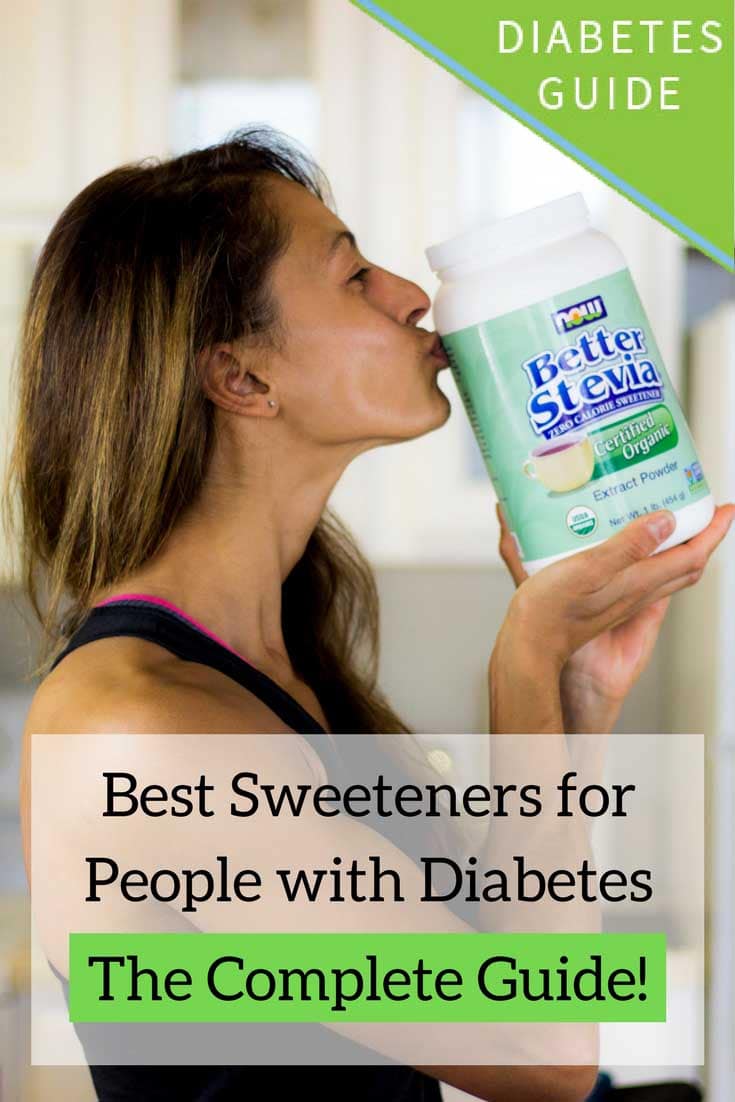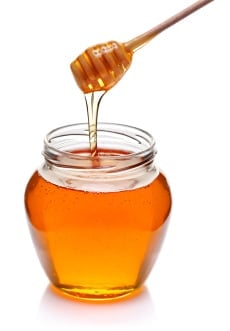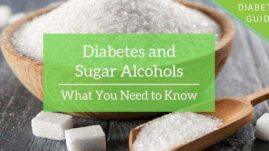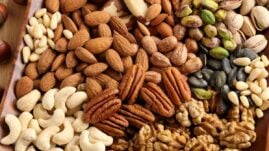This post may contain affiliate links. Please read our disclosure.
I am often asked about what the best sweeteners are for people with diabetes and what can be used as a replacement for sugar that won’t raise blood sugar. That’s why I have created this in-depth guide to natural and artificial sweeteners for people with diabetes.

I get a little frustrated when reading or hearing outright incorrect claims and marketing spin about how some of the natural and artificial sweeteners affect your blood sugar.
As a person with diabetes, I want to know exactly what will happen to my blood sugar when I eat or drink something, and I don’t take kindly to half-true marketing claims.
I’ve decided to focus on which natural and artificial sweeteners are good for people with diabetes as it relates to impact on blood sugar, rather than on whether they are healthy choices in general since I think that is somewhat out of my domain and because plenty of others have already covered that.
Table of Contents
What are natural & artificial sweeteners?
The FDA defines sweeteners as: “…commonly used as sugar substitutes or sugar alternatives because they are many times sweeter than sugar but contribute only a few or no calories when added to foods”.
This means that regular sugar, honey, and Agave nectar/syrup don’t fall into the sweetener category. However, I do want to address these quickly before moving on to the real natural and artificial sweeteners, since I’ve seen claims of how honey and agave won’t impact blood sugar in the same way as sugar.
Sugar substitutes that are NOT blood sugar friendly
Honey

Let’s start with honey because, let’s face it, it’s sugar in liquid form (82% of honey is sugar, the rest is water and small amounts of pollen, etc.).
It’s delicious, but a 2015 study in the Journal of Nutrition found that when subjects were given honey, cane sugar, or high-fructose corn syrup, they saw no notable difference in blood sugar increase.
The only benefit of honey over regular table sugar from a blood sugar perspective is that honey is slightly sweeter so you can use a little bit less of it and achieve the same sweetness. But that still doesn’t make it a good option for people with diabetes!
Agave Nectar
I think that the corporate marketing machine has been very clever when declaring agave nectar is a health food, for as Dr. Jonny Bowden points out“..It’s basically high-fructose corn syrup masquerading as healthy food.”
Agave nectar may have a lower glycemic index than sugar or honey, but it’s still up to 90 percent liquid fructose.
At the end of the day, sugar is sugar. Honey or agave nectar may be slightly better for you than pure white sugar from an overall nutrition perspective, but don’t get tricked into thinking that they are blood sugar-friendly alternatives.
Natural & artificial sweeteners that won’t affect blood sugar
None of the natural and artificial sweeteners I list below will affect your blood sugar in their raw form, but you have to make sure that the manufacturer hasn’t added anything else to the product such as fillers or flavors.
With the exception of aspartame, none of the sweeteners can actually be broken down by the body, which is why they won’t affect your blood sugar. Instead, they’ll pass through your systems without being digested, so they provide no extra calories.
Natural Sweeteners
New natural low-calorie and low-carb sweeteners have come to market in recent years, which is exciting if you’re looking to reduce your carb intake but still enjoy something sweet.
Here we’ll talk about 3 different natural sweeteners that will have little to no impact on your blood sugar
Stevia
I’m often asked if Stevia is good for people with diabetes. And I love that I can answer YES! Stevia is great for people with diabetes and will not raise blood sugar levels. It’s actually my sweetener of choice.
So, what is Stevia? Stevia is a completely natural sweetener since it’s simply an extract from the leaves of the plant species Stevia Rebaudiana. Most grocery stores carry it and you can purchase it as a powder, extract, or flavored drops.
In its purest processed form, Stevia is about 300 times sweeter than regular table sugar but the products available on the market have varying degrees of sweetness so it’s important to know the sweetness of the product you use.
Stevia powder: I used to buy the standard supermarket brand Stevia powder until I realized that they mix it with fillers (primarily dextrose) to make it behave more like sugar. This actually has some calorie impact as well as a minimal effect on your blood sugar if you use large amounts.
The nutritional label will claim that it’s a zero-calorie food, but that’s only because the FDA allows all food with less than 0.5 g sugar per serving to be categorized as having zero calories.
All that being said, I do still use powdered Stevia as a sugar replacement for baking as it reacts well to heat. If you use a brand like Stevia in the Raw, it substitutes one-for-one to sugar and I just acknowledge that it might have a minimal/neglectable impact on blood sugars.
Stevia extract: In general, I recommend buying Stevia extract instead of powdered stevia because it’s pure Stevia with nothing added.
The extract has a more intense flavor but you’ll get the sweetness without any calories or blood sugar impact whatsoever. To me, that’s a winner if you want a natural sweetener to sweeten up your morning coffee or oatmeal. I use the NOW brand Stevia Extract.
Flavored Stevia drops: If you have a hard time drinking enough water (or just think plain water is boring), you have to try Sweet Leaf’s Liquid Stevia Drops. You simply squirt a few drops into your water and it tastes like lemonade, but without the blood sugar impact.
Monk fruit
Monk fruit is another good choice for people with diabetes since it’s a natural sweetener that won’t affect your blood sugar.
I’ve tried it, but it’s not a product I really use simply because I prefer the taste of Stevia (monk fruit has a slightly fruity aftertaste). But that’s a personal preference, many people really like monk fruit.
It’s a good alternative if you are looking for a natural sweetener but don’t like the taste of Stevia.
Always carefully read the nutrition label when buying monk fruit extract as some brands combine the monk fruit with sweeteners like Erythritol or even sugar and molasses. I recommend the brand Monk Fruit in the Raw.
Allulose
Allulose is a simple sugar (monosaccharide) and should not affect blood sugars as it’s not metabolized by the body.
It’s a naturally occurring sweetener and can be found in small quantities in different foods such as maple syrup, brown sugar, wheat, and fruits (e.g., raisins, dried figs). However, whereas those foods will impact blood sugars and add calories to what you eat or drink, allulose won’t and is nearly calorie-free.
Allulose is 70% as sweet as regular sugar so you need to use slightly more if you are replacing regular sugar in a recipe or if you’re just sweetening your tea or coffee.
The FDA has reviewed allulose and determined that it’s a very low-calorie sweetener (i.e., no more than 0.4 kcal/g). The carbs in allulose are included on the nutrition label of foods that contain allulose (in contrast to many other low-carb sweeteners where the carbs aren’t included) but that is only because the FDA determines carb counts based on chemical markup rather than blood sugar impact.
What’s exciting about allulose, and what sets it apart from other natural sweeteners, is that clinical studies have shown that it can potentially help with blood sugar management. The studies were very small, but they showed that when people not living with diabetes as well as people living with pre-diabetes ate allulose together with carbohydrates, the blood sugar impact wasn’t as big as when allulose wasn’t included.
Artificial Sweeteners (FDA approved only)
The list below covers the FDA-approved artificial sweeteners and their brand names.
None of them should affect your blood sugar but there is a lot of controversy about whether or not they have long-term health implications. I won’t go into that in this post, but my personal preference is to stick to the natural stuff. I mean, if it pretty much tastes the same, why take the chance?
- Acesulfame potassium (also called acesulfame K) – Sunett & Sweet One
- Aspartame – Equal & Nutrasweet
- Saccharin – Sweet ‘N Low, Sweet Twin & Sugar Twin
- Sucralose – Splenda
- Neotame – NA
- Advantame – A Sweet Leaf, Sun Crystals, Steviva, Truvia & PureVia
Low-calorie alternatives
Other sweeteners, which are often used in diet foods, food labeled as “sugar-free”, and sugar-free gum, are sugar alcohols.
Per the American Society for Nutrition: “Sugar alcohols are slightly lower in calories than sugar and do not promote tooth decay or cause a sudden increase in blood glucose.”
The most common sugar alcohols are Maltitol, Sorbitol, Xylitol, Erythritol, and Isomalt (that’s a lot of names to remember, so I generally just categorize them as the ‘ols’).
They do indeed affect your blood sugar less than regular sugar, but their main problem is that they also work as laxatives. This means that they most likely will give you gas or cause bloating. I can eat some of them in small amounts but my body reacts badly to Xylitol.
Sugar alcohols give you about 2.5 calories/gram versus 4 calories/gram for regular sugar so if you can stomach them (pun intended), you can reduce the blood sugar impact by 50% by using any of these sweeteners. To me, this is not really worth the potential health issues and side effects.
So what are the best sweeteners for people with diabetes?
In general, there is no reason not to choose one of the natural sweeteners that don’t affect blood sugar – Stevia, monk fruit, or allulose. They are all great for people with diabetes and you can choose whichever one you think tastes the best. For baking, Stevia in the Raw is my preferred sweetener as it retains its taste and acts the most like sugar when heated.
Artificial sweeteners and sugar alcohols are not terrible, but they do potentially have side effects, the most common of which is digestive issues. I, therefore, see no reason to use them when natural and safe alternatives are available.
Sugar substitutes such as honey and agave nectar are essentially identical to normal sugar when it comes to blood sugar impact. I do keep both sugar and honey in the house for the rare occasions when I want to bake something really decadent (like a birthday cake), but I try to use it as little as possible.
Suggested next posts:





Laura
Hi I was wondering if you could tell me what you think of premiere protein shakes. I’m newly diagnosed with type 2 I’m on metformin. And not been able to get into a endocrinologist or any nutrition classes yet I was using the shake in my coffee. I’ve been wondering about it and decided to reach out since I read your newsletter
Christel Oerum
I don’t have any experience with this product but it looks fairly decent. What you want to look at is the total carb amount as well as the added sugar. When I look at the Vanilla it has 4 g carbs and 1 g sugar per serving. My guess is that you don’t use a whole serving in your coffee, but even if you do it’s a fairly low amount. What I would suggest is to measure your blood sugar before you enjoy it and again 60-90 minutes after and write down the blood sugar change. That way you can get an idea if this product is good for your blood sugars (we all react a little differently). But do remember that coffee can also impact blood sugars, so if you see a spike it might be the coffee and not the creamer (https://diabetesstrong.com/coffee-and-diabetes/)
Rosie
I’m very upset!! I went and got a box of Stevia in the raw as you said you use this natural sweetener. I wanted a natural sweetener instead of one made in a lab! Well,there’s Dextrose in it!!! Diabetics can’t have dextrose!! So,not happy! Well,i’ve learned to fully read the ingredients list on the label of products for sure now!!
Tobias Oerum
Agreed! Christel actually writes under the Stevia powder headline that many brands add fillers (including dextrose) that can have a small blood sugar impact. It would be great if they didn’t, but the dextrose is still in such a small amount that Christel can use Stevia powder without any problems.
Guy
Hello Christel,
Have you heard of or used Bocha Sweet?
I just purchased a package of it in individual packets, tastes great, no aftertaste I can detect.
It is made from Kabocha Extract, which contains Pentose.
Guy
Christel Oerum
I have not, until now. Will have to try it if I come across it at the store
Claudette Hendricks
Hi,
I have just begun reading your articles and find them very informative. Thanks so much. When you talk about stevia in the raw, I just want to cringe. The filler in that product is maltodextrin which is higher on the glycemic index then sugar and is made from high fructose corn syrup. To say a half gram of the product measures 0 in calories is deceiving in my opinion, because in reality when you make a batch of cookies or a cake you’re going to use at least a cup of that sweetener. It’s really a great way to spike your sugars. Even most foods in the stores now have gotten rid of high fructose corn syrup and replaced it with maltodextrin. We should not think this is good. Please don’t encourage diabetics to eat that. Truvia has a baking product that’s 1:1 that doesn’t use maltodextrin, it’s truvia sweet complete and they have it in brown sugar and powdered sugar. We should never let these corporations get away we adding sugars and stating lower sugars when it really isn’t. As stevia has done. Thanks again for all your insights!
Christel Oerum
I’m aware of the added Maltodextrin in that Stevia product. In my experience, it’s so minimal that it doesn’t have a noticeable blood sugar impact. However, I always encourage everyone to try out different foods as well as sweeteners as we won’t all have identical blood sugar responses
Lisa
How do you know if it’s working or if it is not working will it make you feel funny weak dizzy low energy what are you looking for if it’s not working and if you’re borderline diabetic and I know pills or medication
Lisa
This is from Lisa again also right now I am doing Nutrisystem and they have a chocolate drink it’s a protein drink could you put two scoops in the protein drink or does it have to be water coffee tea yogurt or something else
Christel Oerum
Could you rephrase the question, please? You might have added it to the wrong article, this article is about sweeteners
Karen
Hello Cristel, I have used Allulose and do like it. However, it browns very fast when used for baking. Also what do you think about Swerve?
Christel Oerum
Thank you, that’s a good addition. I do like Swerve and have used both the granulate and the confectionary sugar. The main downside to that product is the packaging. It’s hard to reseal and once any moisture comes into the package it turns into one big sweetener lump. Also, I find that the confectionary sweetener tastes a bit metallic
Kristan
What about pure maple syrup?
Christel Oerum
Syrup is essentially liquid sugar. It will impact your blood sugar but if you prefer the taste and enjoy it in very small amounts it might be worth it for you
Susan
What do you think of sucralose?
What about the impact of dextrin/ Maltodextrin that gets added to some powdered sweetners?
What exactly IS Allulose?
Christel Oerum
I don’t mind sucralose in very small amounts (if all they have at the coffeeshop is Splenda and I want my coffee sweetened I’ll use that), but it can make you really gassy. FDA has over 110 studies on file showing its safety so I’m not that concerned. I haven’t tested larger amounts to see if it has a blood sugar impact on me. The same thing goes for most other artificial sweeteners, I prefer the natural ones.
As for dextrin/ Maltodextrin, for the most part, the amounts added (like Stevia in the Raw) are so small that I don’t see a blood sugar impact, but if you’re very sensitive you might.
I don’t have any experience with Allulose, but it seems promising from a blood sugar standpoint
Kellie
The most frustrating part of sugar substitutes for me is that they cause migraines. Even as little as one sip of diet soda (even with Stevia) or one bite of a snack will trigger a headache. I have yet to see anyone address this problem and am desperate for a solution. I can’t be the only one out there who suffers migraines after consuming sugar substitutes. There are no commercially flavored waters, fruit drinks, teas, sodas, baked treats or chewing gum that doesn’t have sugar substitutes, to my knowledge. So what is the best natural alternative if you can’t even consume Stevia? Please help! Thank you so much.
Christel Oerum
That’s frustrating. It’s not an issue I have researched but you’re probably not alone. An alternative is to drink/eat the full-sugar product but stick to smaller amounts or, if you use insulin, simply bolus for it. I do wonder if it’s the Stevia or the other sweeteners that are sometimes added that triggers the migranes. You could try Stevia extract, which’s 100% Stevia, and the other alternative is Monkfruit
Aryan
My mother is diabetic and she consumed honey thinking that it won’t affect her blood sugar level but this article was an eye-opener for us. I’m also a contributor at Morning Mail I would love to share the knowledge gained from here. Thanks for sharing
Christel Oerum
I’m glad this was helpful. And you’re always more than welcome to quote Diabetes Strong – Thanks
Na Lester
Hi, I am allergic to Stevia… Are there any other recommendation for natural sweeteners that I can use not only for everyday use but also for baking? Thank You in advance for your response.
Christel Oerum
You can try monk fruit which is the other natural sweetener mentioned in the article